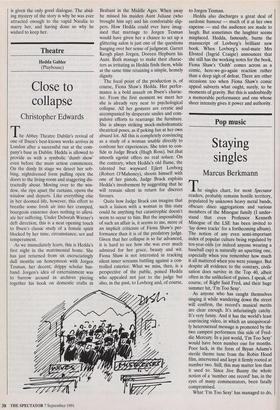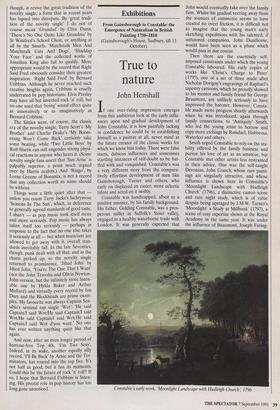Pop music
Staying singles
Marcus Berkmann
The singles chart, for most Spectator readers, probably remains hostile territory, populated by unknown heavy metal bands, obscure disco aggregations and various members of the Minogue family (I under- stand that even Professor Kenneth Minogue of the LSE has been invited to lay down tracks' for a forthcoming album). The notion of any even semi-important index of popular culture being regulated by ten-year-olds (or indeed anyone wearing a baseball cap) is naturally an upsetting one, especially when you remember how much it all mattered when you were younger. But despite all evidence to the contrary, civili- sation does survive in the Top 40, albeit often in the unlikeliest of guises. I speak, of course, of Right Said Fred, and their huge summer hit, 'I'm Too Sexy'.
As anyone who has caught themselves singing it while wandering down the street will confirm, the record's musical merits are clear enough. It's infuriatingly catchy. It's very funny. And it has the world's least convincing video, in which an unequivocal- ly heterosexual message is promoted by the two campest performers this side of Fred- die Mercury. In a just world, 'I'm Too Sexy' would have been number one for months. Poor luck, in the form of Bryan Adams's sterile theme tune from the Robin Hood film, intervened and kept it firmly rooted at number two. Still, this may matter less than it used to. Since Jive Bunny the whole notion of a 'number one record' has, in the eyes of many commentators, been fatally compromised.
What 'I'm Too Sexy' has managed to do, though, is revive the great tradition of the novelty single, a form that in recent years has lapsed into disrepute. By `great tradi- tion of the novelty single' I do not of course mean `Grandad' by Clive Dunn, 'There's No One Quite Like Grandma' by St Winifred's School Choir, or anything at all by the Smurfs. `Matchstalk Men And Matchstalk Cats And Dogs', ‘Shaddap Your Face' and the collected works of Jonathan King also fail to qualify. More appropriate would be the record that Right Said Fred obviously consider their greatest inspiration: 'Right Said Fred' by Bernard Cribbins. Although he never reached such creative heights again, Cribbins is cruelly underrated by pop historians. Elvis Presley may have all but invented rock 'n' roll, but no one used that 'boing' sound effect quite as innovatively or as imaginatively as Bernard Cribbins.
The Sixties were, of course, the classic era of the novelty single- Terry Scott's 'My Brother' and Charlie Drake's 'My Boom- erang Won't Come Back' certainly take some beating, while 'Two Little Boys' by Rolf Harris can still engender strong physi- cal reactions in anyone who hears it. (Some novelty single fans assert that 'Sun Arise' is palpably superior, a point much argued over by Harris zealots.) And 'Ringo', by Lorne Greene of Bonanza, is not a record that any collection worth its name should be without.
Things went a little quiet after that — unless you count Terry Jacks's lachrymose 'Seasons In The Sun', which, in deference to generally agreed standards of good taste, I shan't — as pop music took itself more and more seriously. Pop music has always taken itself too seriously — perhaps in response to the fact that no one else takes it seriously at all — but when musicians are allowed to get away with it, overall stan- dards inevitably fall. In the late Seventies, though, punk dealt with all that, and as the charts perked up, so the novelty single returned to prominence. 'Jilted John by Jilted John, 'You're The One That I Want' (not the John Travolta and Olivia Newton- John version, but the infinitely more listen- able one by Hylda Baker and Arthur Mullard) and virtually every record by Ian Duly and the Blockheads are prime exam- ples. My favourite was always Captain Sen- sible's seminal rap single 'Woe: 'He said Captain/I said Wot/He said Captain/I said Wot/He said Captain/I said Wot/He said Captain/I said Wot d'you want.' No one has ever written anything quite like that again.
And now, after an even longer period of humour-free Top 40s, 'I'm Too Sexy'. Indeed, in its wake, another equally silly record, 'I'll Be Back' by Arnie and the Ter- minators, has roared into the top five. It's not half as good, but it has its moments. Could this be the future of rock 'n' roll? If so, I hope that Bernard Cribbins is listen- ing. His pivotal role in pop history has too long gone unnoticed.



















































 Previous page
Previous page